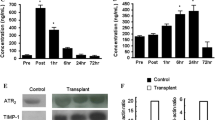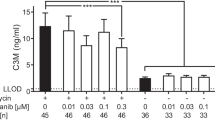Abstract
Type III procollagen N-peptides (PIIINPs) are believed to be released in stoichiometric amounts as type III collagen molecules are secreted from cells. We hypothesized that if the human lung actively produces type III collagen a detectable transpulmonary gradient in PIIINPs would exist in normal individuals that might be altered following a pulmonary insult. PIIINPs were therefore measured by radioimmunoassay in serum taken simultaneously from the pulmonary artery (PA) and left ventricle/aorta (LV) in 11 patients undergoing routine cardiac catheterisation. Mean PIIINP levels±SEM in LV were 66.8±5.4 μg·ml−1 and 59.9±4.1 μg·ml−1 in PA (p<0.04). In 6 patients, repeat measurements taken 4 h after cardiopulmonary bypass revealed a significant fall in PA values to 43.8±2.6 μg·ml−1 (p<0.001) and abolition of the transpulmonary gradient. These results suggest the adult human lung actively synthesis type III collagen and that, in the short term, cardiopulmonary bypass inhibits this process.
Similar content being viewed by others
References
Zapol WM, Trelstad RL, Coffey JW et al (1979) Pulmonary fibrosis in severe acute respiratory failure. Am Rev Respir Dis 119:547–554
Mays PK, McAnulty RJ, Laurent GJ (1989) Age-related changes in lung collagen metabolism: a role for degradation in regulating lung collagen synthesis. Am Rev Respir Dis 140:410–416
Rennie MJ, Edwards RHT, Halliday D, Matthews D (1982) Muscle protein synthesis measured by stable isotope techniques in man: the effects of feeding and fasting. Clin Sci 63:519–523
Ristelli L, Ristelli J (1986) Radioimmunoassays for monitoring connective tissue metabolism. In: Schattenkirchner M (ed) Rheumatology. An annual review. Karger, Basel, pp 216–245
Fessler LI, Timpl R, Fessler JH (1981) Assembly and processing of procollagen type III in chick embryo vessels. J Biol Chem 256:2531–2537
Bentsen KD, Horslev-Petersen K, Junker P, Juhl E, Lorenzen IB (1987) Serum aminoterminal procollagen type III peptide in acute viral hepatitis. A long-term follow up study. Liver 7:96–105
Hochweiss S, Fruchtman S, Hahn SG, Gilbert H, Donovan PB, Johnson J, Goldberg JD, Berk PD (1983) Increased procollagen serum type III aminoterminal peptide in myelofibrosis. Am J Haematol 15:343–351
Risteli L, Kauppila A, Kakila UM, Risteli J (1988) Aminoterminal propeptide in serum — an indicator of clinical behaviour of advanced ovarian carcinoma? Clin Chem 34:715–718
Black CM, McWhirter A, Harrison NK, Laurent CJ (1989) Serum type III procollagen peptide concentrations in systemic sclerosis. Br J Rheumatol 28:98–103
Rhode H, Langer I, Krieg T, Timpl R (1983) Serum and urine analysis of the aminoterminal procollagen peptide type III by radioimmunoassay with antibody Fab fragments. Coll Relat Res 34:715–718
Kirk JME, Bateman ED, Haslam PL, Laurent GJ, Turner-Warwick M (1984) Serum type III procollagen peptide concentration in cryptogenic fibrosing alveolitis and its clinical relevance. Thorax 39:726–732
Watanabe Y, Yamaki K, Takagi K, Satake T (1985) Type III procollagen N-terminal peptides in experimental pulmonary fibrosis and human respiratory diseases. Eur J Respir Dis 67:10–16
Cavalleri A, Gobba F, Bacchella L, Luberto F, Ziccardi A (1988) Serum type III procollagen peptide in asbestos workers: an early indicator of pulmonary fibrosis. Br J Ind Med 45:818–823
Low RB, Cutroneo KR, Davis GS, Giancola MS (1983) Lavage type III procollagen N-terminal peptides in human pulmonary fibrosis and sarcoidosis. Lab Invest 48:755–759
Bjermer L, Engstrom-Laurent A, Lundgren R, Rosentall L, Hallgren R (1987) Hyaluronate and type III procollagen peptide in bronchoalveolar lavage fluid as markers of disease activity in farmer's lung. Br Med J 295:803–806
Nerlich AG, Nerlich ML, Langer I, Demling RH (1984) Release of amino-terminal procollagen peptides in paraquat-induced acute pulmonary fibrosis. Exp Mol Pathol 40:311–319
Fowler AA, Hamman R, Good JT et al (1983) Adult respiratory distress syndrome; risk with common predispositions. Ann Intern Med 98:593–597
Messent M, Sullivan K, Keogh BF, Morgan CJ, Evans TW (1992) Adult respiratory distress syndrome following cardiopulmonary bypass. Anaesthesia (in press)
MacNaughton PD, Braude S, Morgan CJ, Denison DM, Evans TW (1992) Lung function after cardiopulmonary bypass. Crit Care Med (in press)
Neimala O, Risteli L, Sotaniemi EA, Risteli J (1982)Heterogeneity of the antigens related to aminoterminal propeptide of type III procollagen in human serum. Clin Chim Acta 124:39–44
Last JA, Siefkin A, Reiser KM (1983) Type I collagen content is increased in the lungs of patients with adult respiratory distress syndrome. Thorax 38:364–368
Collins JF, Smith JD, Coalson JJ, Johanson WG(1984) Variabilitiy of lung collagen amounts after prolonged support of acute respiratory failure. Chest 85:641–646
Entzian P, Huckstadt A, Kriepe H, Barth J (1990) Determination of serum concentrations of type III procollagen peptide in mechanically ventilated patients. Am Rev Respir Dis 142:1079–1081
Smedsrod B (1988) Aminoterminal peptide of type III procollagen is cleared from the circulation by receptor-mediated endocytosis in liver endothelial cells. Coll Relat Res 8:375–388
Author information
Authors and Affiliations
Rights and permissions
About this article
Cite this article
Harrison, N.K., Laurent, G.J. & Evans, T.W. Transpulmonary gradient of type III procollagen peptides: Acute effects of cardio-pulmonary bypass. Intensive Care Med 18, 290–292 (1992). https://doi.org/10.1007/BF01706477
Received:
Accepted:
Issue Date:
DOI: https://doi.org/10.1007/BF01706477




